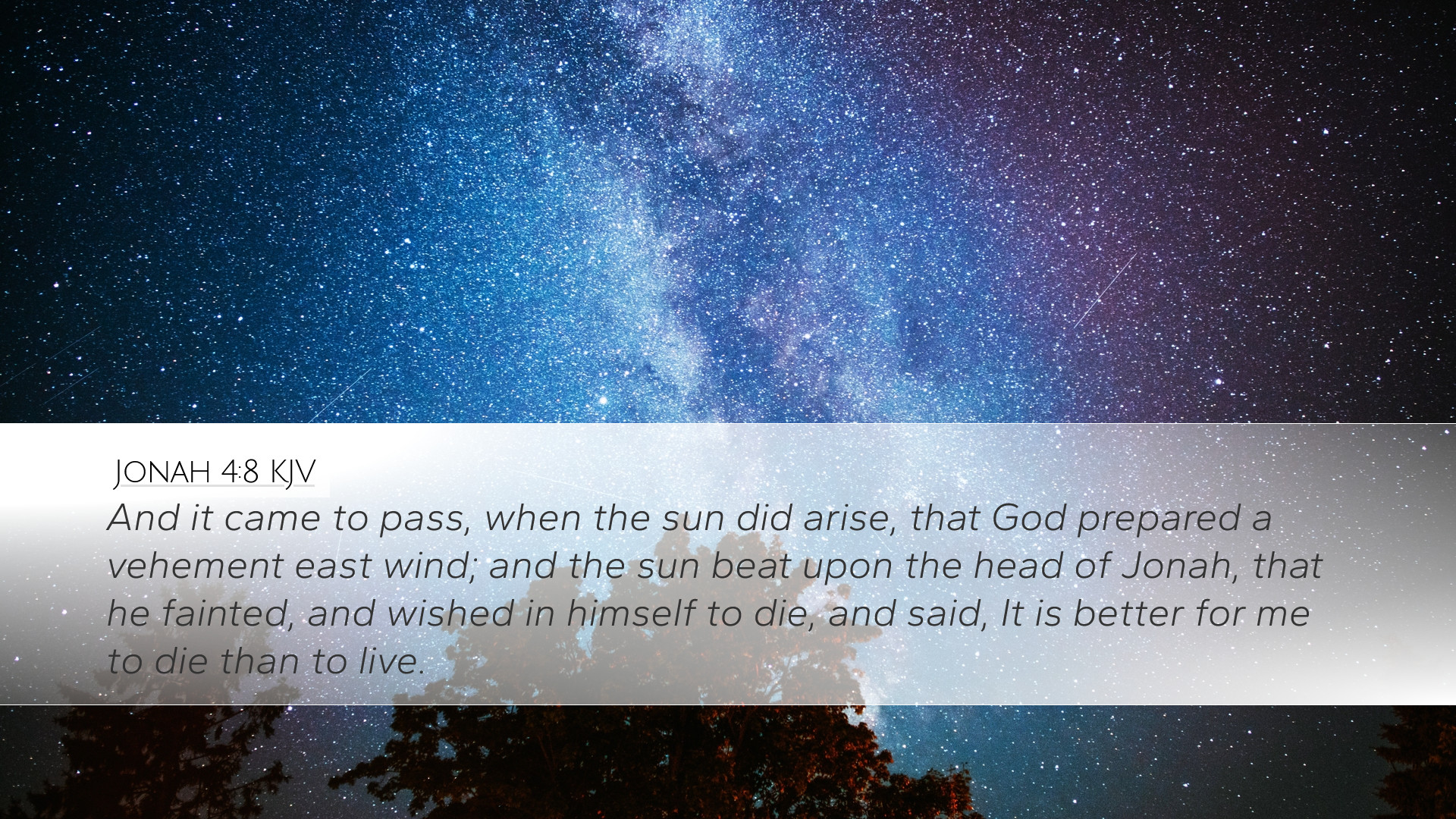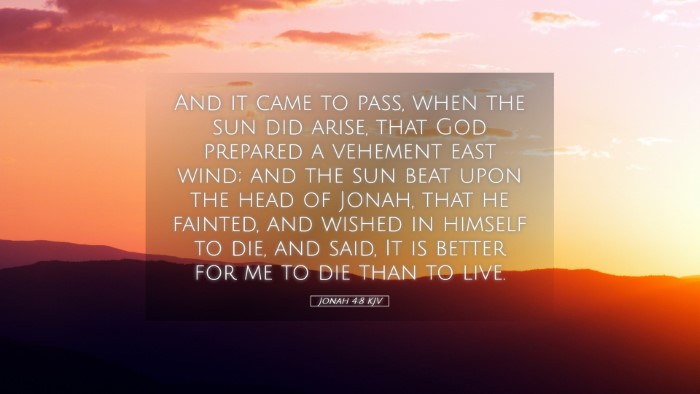Old Testament
Genesis Exodus Leviticus Numbers Deuteronomy Joshua Judges Ruth 1 Samuel 2 Samuel 1 Kings 2 Kings 1 Chronicles 2 Chronicles Ezra Nehemiah Esther Job Psalms Proverbs Ecclesiastes Song of Solomon Isaiah Jeremiah Lamentations Ezekiel Daniel Hosea Joel Amos Obadiah Jonah Micah Nahum Habakkuk Zephaniah Haggai Zechariah MalachiJonah 4:8
Jonah 4:8 KJV
And it came to pass, when the sun did arise, that God prepared a vehement east wind; and the sun beat upon the head of Jonah, that he fainted, and wished in himself to die, and said, It is better for me to die than to live.
Jonah 4:8 Bible Commentary
Commentary on Jonah 4:8
The verse Jonah 4:8, "And it came to pass, when the sun did arise, that God prepared a vehement east wind; and the sun beat upon the head of Jonah, that he fainted, and wished in himself to die, and said, It is better for me to die than to live," encapsulates a moment of deep despair for the prophet Jonah. This commentary seeks to unpack the implications of Jonah’s experience, drawing insights from public domain scholars like Matthew Henry, Albert Barnes, and Adam Clarke.
Contextual Understanding
This verse falls within the broader narrative of Jonah, a prophet who initially resisted God's command to go to Nineveh, ultimately finding himself in a struggle against his own discontent and the mercy of God toward sinners. In examining this verse, it is crucial to recognize Jonah's situational context—having recently witnessed the repentance of Nineveh, he is in an emotional and spiritual turmoil.
The Significance of the Vehement East Wind
The mention of a "vehement east wind" is particularly significant:
- Symbol of Divine Intervention: As noted by Matthew Henry, this wind serves as a divine tool, highlighting God's omnipotence and control over nature. Jonah’s discomfort is both physical and spiritual, reinforcing the theological point that God's ways often confound our human understanding.
- Contrast with Earlier Comfort: Albert Barnes reflects that the gourd had provided shade and comfort to Jonah, which was soon removed. The sudden transition from comfort to distress mirrors Jonah’s own fluctuating emotional state, revealing the fragility of human comfort against divine purpose.
- Nature Reflects Journey: Adam Clarke points out how the elements—wind and sun—serve as a reflection of Jonah's internal struggles. The fierce east wind not only signifies the intensity of Jonah's discomfort but also represents the turmoil in his heart regarding God’s mercy.
Jonah's Reaction: A Reflection of Human Nature
Jonah's despair, wishing to die rather than continue living under his circumstances, is a profound commentary on human nature:
- A Cry for Release: As Matthew Henry elaborates, Jonah’s wish to die indicates the extreme nature of his emotional and spiritual crisis. He felt overwhelmed by circumstances beyond his control, a sentiment many can relate to in moments of life’s trials.
- Resistance to God's Plan: Albert Barnes observes that Jonah’s desire to die rather than to witness God’s mercy extended to Nineveh illustrates a resistance to divine mercy that many believers grapple with. It raises theological questions about grace and who is deemed worthy of it.
- Self-Destructive Thinking: Adam Clarke discusses how depressive states can skew perception, leading to thoughts of despair. Jonah's desire for death reflects a moment where his feelings have overtaken rational thought, emphasizing the need for pastoral care and support in such times.
Theological Implications
The verse invites rigorous theological reflection on several levels:
- The Nature of God’s Sovereignty: The events in Jonah 4:8 challenge believers to contemplate God's sovereignty. Despite Jonah’s emotional rebellion, God remains in control, employing creation itself to convey lessons of humility and mercy.
- Grace Beyond Borders: The compassion shown to Nineveh poses questions about the scope of God’s grace. Matthew Henry suggests that Jonah's struggles exemplify the challenge of accepting that God’s grace may extend to those we deem unworthy.
- Life and Death Decisions: Jonah's wish to die highlights an aspect of human existence where individuals confront issues of despair and purpose. It underscores the need for individuals to seek God’s perspective in turmoil.
Application for Pastors and Theologians
This verse is rich with application potential for ministry and theological discourse:
- Encouragement in Times of Despair: Pastors can use Jonah’s story as a means to advocate for the importance of addressing mental health and emotional wellbeing in their communities. The relational dynamics between God and Jonah provide a landscape for pastoral care that is empathetic and understanding.
- Preaching on Divine Mercy: Sermons focusing on God’s mercy can be enriched by Jonah’s struggle. It challenges congregations to rethink their views on who deserves grace and how they respond to God’s work in the lives of others.
- The Call to Obedience: The lesson surrounding obedience to God’s call is critical for both individual believers and church leadership. Jonah’s initial flight and subsequent regret lead to discussions about the costs of disobedience contrasted with the benefits of fulfilling God’s calling.
Conclusion
Ultimately, Jonah 4:8 is a powerful reminder of the complexities of human emotion in relation to divine purpose. It highlights the struggle between personal feelings and the overarching sovereignty of God’s mercy. Through the lens of public domain commentaries, we gain insights that beckon readers towards deeper theological reflection and practical application in both personal and communal faith contexts.


